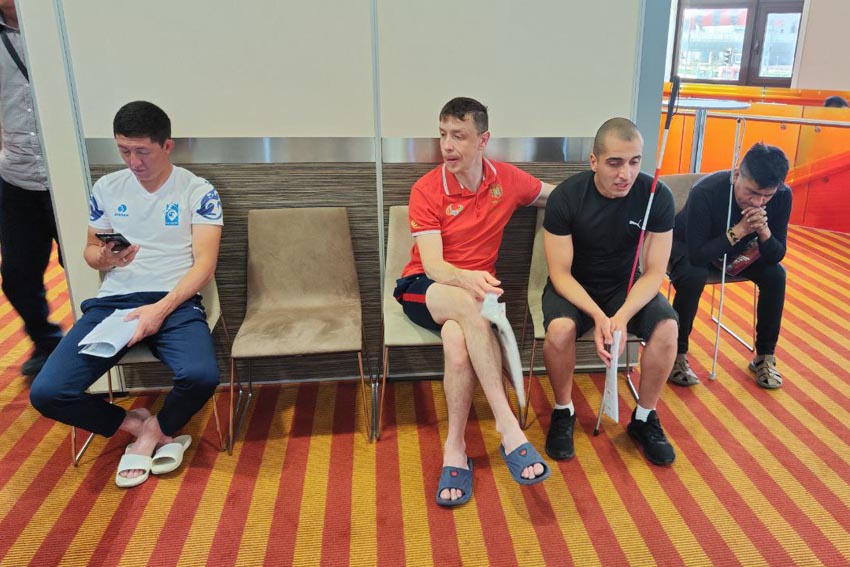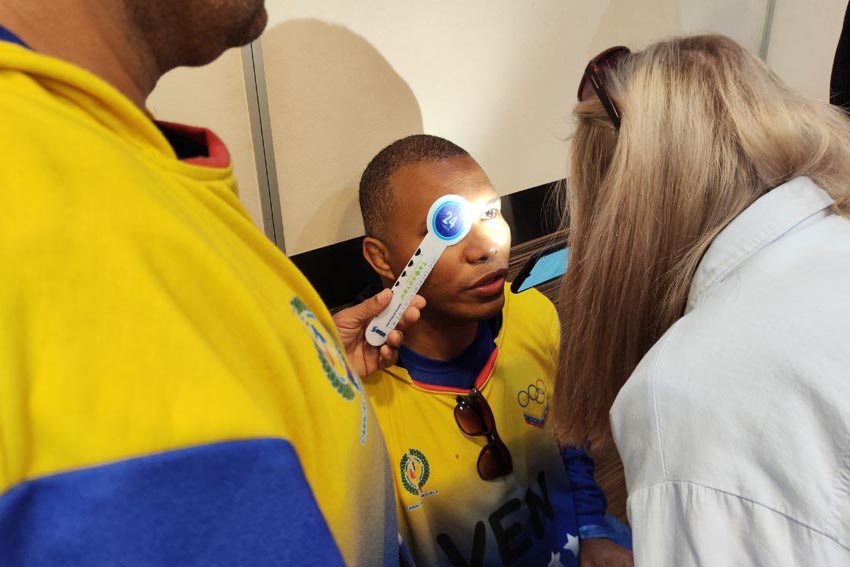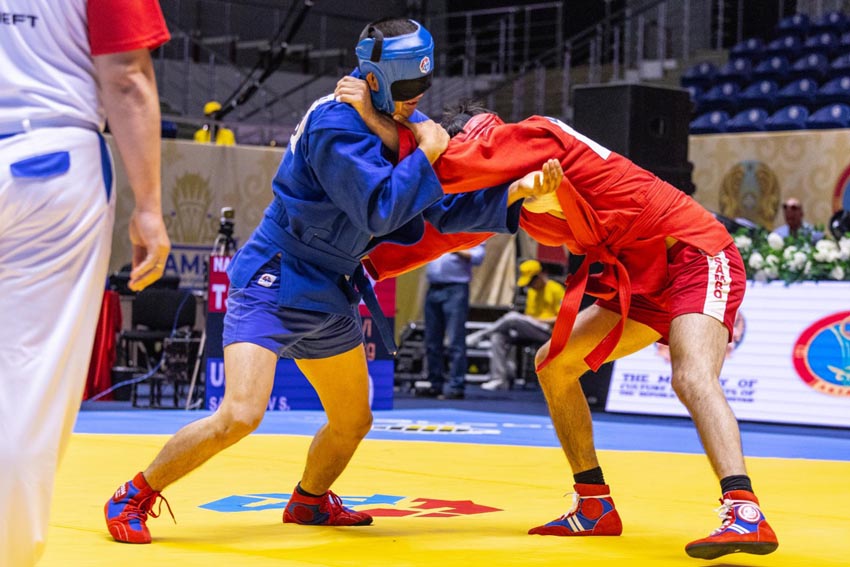5 reasons why the Asia and Oceania SAMBO Championships for the Blind and Visually Impaired has become a historic event
A lot of excitement and responsibility – for participants and organizers; sincere interest and surprise, growing into admiration – for the fans in the stands and TV viewers. The first Asia and Oceania SAMBO Championships for the Blind and Visually Impaired, which took place on June 7 in the capital of Kazakhstan, Astana, was remembered by such emotions. The tournament not only became a historical event in itself, but also opened the way for sambists with visual impairments to multisport competitions on a planetary scale.
1. Classification of athletes
Medals in SAMBO for the Blind and Visually Impaired within the Asia and Oceania SAMBO Championships were played for the first time. Competitions were held among men aged 18 years and older in the class SVI-1 (totally blind) and SVI-2 (visually impaired) in the weight categories 58 kg, 64 kg, 71 kg, 79 kg, 88 kg, 98 kg and over 98 kg. And if usually the main issue that worries athletes before the start of fights is weighing, then for the blind and visually impaired one more is added: classification.

“Athletes were classified in Astana by a group of international FIAS classifiers. It was critically important for us to objectively determine the state of vision of the athletes, which allowed them to subsequently compete in equal conditions in accordance with their class. For this, a separate day was allocated before the start of the championship, which allowed specialists to fully examine all the participants of the tournament,” said Roman Novikov, chief curator and ideological inspirer of the championship, chairperson of the FIAS Commission for Athletes with Disabilities.

2. Selection for the World Combat Games
The weight category up to 79 kg in the SVI-1 class was open – representatives of all continents could take part in the competition. Sambists from four parts of the world took advantage of this opportunity: Asia, Europe, Australia and Oceania, as well as Pan-America. In total, representatives of 11 countries of the world took part in the tournament. Blind sambists in the weight category up to 79 kg competed not only for the medals of the Asia and Oceania Championships, but also for tickets to the World Combat Games 2023, which will be held in Saudi Arabia in October.

“Blind and visually impaired martial artists have never participated in these international competitions, and the SAMBO discipline among the blind and visually impaired will be the first sign,” said Roman Novikov.
3. Refereeing
The International Rules for SAMBO for the Blind and Visually Impaired are based on the International Rules for Sports SAMBO. However, there are a number of nuances that the referee needs to know. On the eve of the Asia and Oceania Championships, referees were trained at a seminar, which allowed them to immerse themselves in the specifics of working at such tournaments.
“Referees play a huge role in every competition, and in SAMBO bouts for the blind and visually impaired, their importance increases even more. They not only judge and evaluate the technical actions of the opponents, but also help the athletes enter the mat, navigate in space and start the bout from the grip. The referee’s team fully coped with all the functions assigned to it and did an excellent job at our tournament. I believe that the absolute absence of injuries in competitions is also largely their merit,” Novikov said.
4. Organization of competitions
The Kazakhstan Federation of Sports and Combat SAMBO, with the support of the Sambo Union of Asia and Oceania, as well as the International Sambo Federation, has become a pioneer in organizing and holding a SAMBO tournament among the blind and visually impaired in the program of the Asia and Oceania Championships.
“I consider it important to note the high level of the tournament, the organizing committee of the National Federation and the Sambo Union of Asia and Oceania worked “Excellent”, we were provided with comfortable conditions for the competitive process. Separately, I want to say about the contribution of the International SAMBO Federation. A successful debut would not have taken place without the comprehensive support of FIAS, which from the very beginning kept under special control the first international SAMBO start among the blind and visually impaired,” Roman Novikov emphasized.
5. Integration into the SAMBO Family and a look into the future
SAMBO competitions for the blind and visually impaired have become a full-fledged discipline of the large Asia and Oceania SAMBO Championships in Astana. Athletes with visual impairments competed on the same mats as representatives of other disciplines. All sambists communicated together, helped each other to prepare for bouts, congratulated each other on victories and encouraged each other in case of failures.
“In this regard, I want to mention the importance of holding international SAMBO competitions for blind and visually impaired sambists in precisely such formats, when this discipline is fully integrated into the main international SAMBO competitions. This allows visually impaired athletes to become part of a large SAMBO Family and join its traditions,” Roman Novikov believes.
According to him, SAMBO for the blind and visually impaired has successfully made its first international step.
“The model for holding international SAMBO competitions for the blind and visually impaired has been worked out, and now we can move on to scaling. The spectators were convinced how stubborn the bouts turned out to be, because all our participants, despite the great excitement, were determined only to win. And regardless of what place they took in the championship, each of them became a pioneer in international SAMBO tournaments for the blind and visually impaired, and their names will forever remain inscribed in the history of the origin and development of our discipline,” emphasized Roman Novikov.
[VIDEO] SAMBO Motivation for the Blind and Visually Impaired

[VIDEO] Asia and Oceania SAMBO Championships for Blind and Visually Impaired 2023

-
Did you see it? 20 August[VIDEO] SAMBO competition among Indian schoolchildren held in Kerala
-
Did you see it? 12 AprilCongratulations on Cosmonautics Day from test cosmonaut, master of sports in sambo Oleg Artemyev
-
Did you see it? 10 AprilDimitar Dimitrov conducted a master class in Brussels
- Watch World Beach SAMBO Championships 2024 in Casablanca, Morocco 8 September 2024
-
Personalities 19 SeptemberMartina VASQUEZ: "I feel confident thanks to my mastery of SAMBO technique"
-
Кaleidoscope 19 SeptemberInternational FIAS Coaches Seminar to be held in Cyprus
-
Federations 18 SeptemberHaitian Youth SAMBO Championship was held in Carrefour
- Watch World Sambo Championships 2022. Bishkek, Kyrgyzstan 17 November 2022
-
Personalities 19 SeptemberMartina VASQUEZ: "I feel confident thanks to my mastery of SAMBO technique"
-
Кaleidoscope 19 SeptemberInternational FIAS Coaches Seminar to be held in Cyprus
-
Federations 18 SeptemberHaitian Youth SAMBO Championship was held in Carrefour
